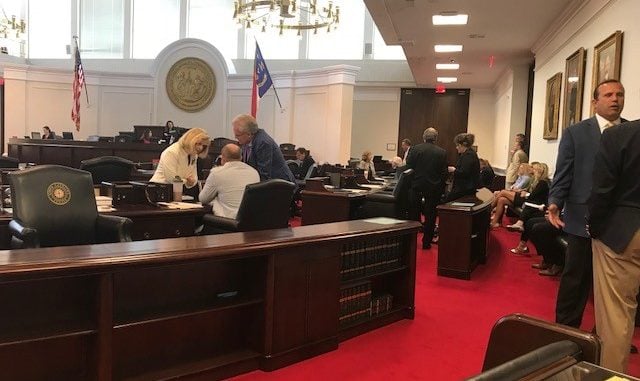
RALEIGH — The N.C. General Assembly sent two pieces of legislation to Governor Roy Cooper’s desk on Tuesday.
The votes happened in a special session this week prompted by House Rules Chair David Lewis (R-Harnett) who formally requested that the speaker call members back to Raleigh to write the language that would be on the ballot for constitutional amendments this fall. Calling the legislature back takes written approval from three-fifths of each chamber, a bar that was easily passed with Republican supermajorities.
The session was necessary, argued Republican leaders, because Democrats were in charge of the commission responsible for writing the ballot language and were playing politics with the process. The House and Senate passed a measure that established that the short titles of each constitutional amendment will appear on the ballot, without extra captions. Rep. Nelson Dollar (R-Wake) said it was about putting unbiased information to voters.
“We got wind that instead of just drafting up neutral captions for these amendments, captions that made sense, we got wind that the secretary of state and the attorney general were going to draw up pejorative captions — captions that may lend someone to say, ‘Well, I don’t want to vote for that,’” said Rep. Nelson Dollar (R-Wake).
“You would think that this would be a fairly simple thing to do, that someone wouldn’t play politics with it, but that’s where we’re at,” said Dollar.
A commission, which at present has two Democrats and one Republican, is normally tasked with writing bill summaries for the voting guides released by the N.C. Board of Elections. In 2016, the legislature directed their summaries to also be placed on the ballots themselves.
After placing six constitutional amendments on this year’s ballot, the Republican-controlled N.C. General Assembly assumed their short titles would be the descriptions on the ballots.
“The General Assembly already approved short titles of the constitutional amendments that accurately describe their impact and must prevent outside attempts to politicize what should be a quick and straightforward administrative process by the commission,” Speaker Tim Moore (R-Cleveland) said in a statement.
The statement also said the commission was not planning to meet until a couple days before the Aug 8 deadline by which the board of elections needs to have all language finalized. They argue this would leave Republicans no time to react if partisan language biasing voters against the amendments were added.
If Gov. Roy Cooper waits the full 10 days before vetoing their legislation, the General Assembly would need to come back again to override. This session would likely be within days of the Aug. 8 deadline, leaving them open to legal challenges of changing important election factors too late in the process.
According to the overview of the bill that emerged Tuesday, “House Bill 3 would remove the requirement of short descriptive captions on the ballot with respect to referendum questions for proposed amendments to the North Carolina Constitution.”
It would also “require the words ‘Constitutional Amendment’ prior to setting forth the referendum question in lieu of a short caption. The Constitutional Amendments Publication Commission would no longer be required to prepare a short caption for use on the ballot.”
A second piece of legislation quickly made its way through both chambers and to the governor on Tueday. That measure would require that judicial candidates be affiliated with the party on their filing paperwork for at least 90 days prior to filing for office. The measure appears to be a response to the race for the N.C. Supreme Court in which Republican candidate Chris Anglin is challenging incumbent Republican Justice Barbara Jackson for a seat on the high court. Anglin reportedly was a registered Democrat until a few weeks before changing his registration and filing to run.
In a statement released Tuesday, Anglin called the legislation “cowardice” and an example of the “shenanigans” that led him to run in the first place.

